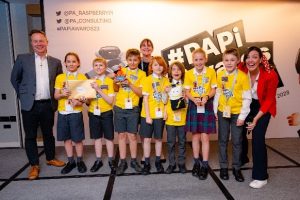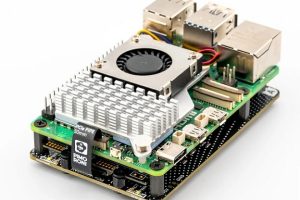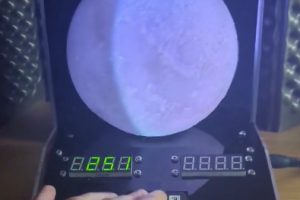The annual compo, an in-person event again in its eleventh year, asks primary, secondary and college students across the UK to invent and create products using the Raspberry Pi’s computing abilities. Basically, to show their ingenuity.
Run by PA Consulting, “Accelerating Energy Transition” was the challenge to be addressed this year. And, as always, the school children rose to the challenge.
 Finalists from each category (full details below) presented their inventions in front of a panel of expert judges, from organisations including Microsoft UK, Network Rail, Coca-Cola, and NHS England. The winning teams each received £1,000 prize money.
Finalists from each category (full details below) presented their inventions in front of a panel of expert judges, from organisations including Microsoft UK, Network Rail, Coca-Cola, and NHS England. The winning teams each received £1,000 prize money.
“We were truly inspired by this year’s record number of finalists,” said David Rees, Head of local government services at PA Consulting. It wasn’t just the technical capabilities that amazed us, but the passion, energy, and sense of purpose around our theme of innovating to accelerate energy transition. The enthusiasm from all of the children throughout the day, and from those that won, is a real joy to witness and be a part of.”
You can read more about the competition here.
The different category winners (both Innovation Inspiration awards) of the 2023 competition are described below, in PA’s own words:
Primary school award, academic years 4-6
· Innovation award – King Edward’s Junior School (Pictured above) designed solar panels to generate heat to save water and energy, in response to the current cost of living crisis.
· Inspiration award – Steeple Bumpstead Primary School created a notification system, using a light sensor to detect when a light is on, to remind people to turn off lights at breaks and lunchtimes at school.
Secondary school award, academic years 7-9
· Innovation award – Francis Holland School, Regent’s Park, designed a Room Environmental Monitor Infobot to reduce their school’s energy use and carbon footprint. The Infobot measures a classroom’s temperature and light level and warns the user when levels are above a certain threshold.
· Inspiration award – Churcher’s College designed a submarine to extract natural and renewable electricity through the use of thermal energy from the seabed and converting it into electricity.
Secondary school award, academic years 10-11
· Innovation award – The Liverpool Blue Coat School developed a system to improve the efficiency of domestic and industrial solar panels. The team calculated the optimum angle(s) at which panels should be fixed throughout the day using hyper-sensitive phototransistors which are rotated by two stepper motors.
· Inspiration award – Stonelaw High School created a drain turbine to manage water usage. The turbine can be installed into pipes, and as water flows down drains, it spins the turbine linked to a rotary encoder, and the amount of water usage is shown on an accompanying app.
Sixth form and college award, academic years 12-13
· Innovation award – Fulford School developed a prototype using a solar panel to power a data centre and to extract the heat, redirecting energy to heat a local swimming pool. This solution enables small businesses to generate revenue whilst reducing their carbon footprint as well as making substantial savings on heating costs.
· Inspiration award – Barking Abbey School designed a smart Pingu device which uses temperature and humidity sensors in the Pingu device to alert users if any appliances are switched on.
See also: PA Consulting celebrates annual Raspberry Pi school coding competition
 Electronics Weekly Electronics Design & Components Tech News
Electronics Weekly Electronics Design & Components Tech News





